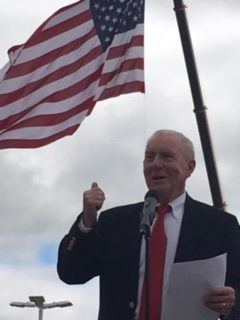
(BEDFORD) – It was perfect weather on Saturday to take in the Lawrence County Cancer Patient Services Car, Trucks, Bikes, and Tractors show at Bedford Ford Lincoln.
Other features included the dunking booths, IU Health Ambulance, Lifeline helicopter from Columbus, Marion Twp. Fire Department and hamburgers and hot dogs cooked by members of the La-Or-Ma Shrine Club in Lawrence County.
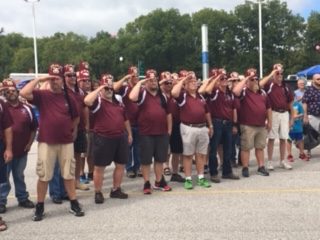
At Noon the flag-raising and National Anthem took place. Taps was played by American Legion Post 33 and Colonel John W. Tilford then delivered a heartfelt speech on Vietnam.
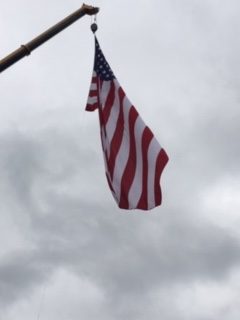
Col. Tilford enlisted in the Marine Corps as a private in March 1965. After serving 38 and half years he retired as Deputy Commander, National Ground Intelligence Center, as a full Colonel, U.S. Army Reserve.
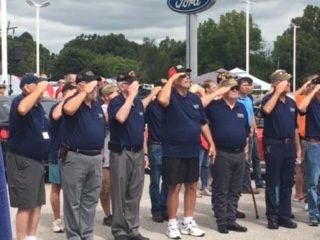
He ended up serving more years ‘called up’ active through the reserves than the four he served with the Marine Corps.
Tilford was awarded the Legion of Merit Defense Meritorious Service Medal while in the Airborne unit at the age of 41. He earned the Expert Infantryman Badge, Drill Sergeant Badge, and others while serving in Vietnam from 1967-1969, and served on the Global War on Terrorism from 2001-2004.
Tilford helped to reorganize the entire troop unit reserve assets of the National Ground Intelligence Center. His last active tour was in 2006 to assist standing up the Defense Joint Intelligence Operations Center within the Defense Intelligence Agency.
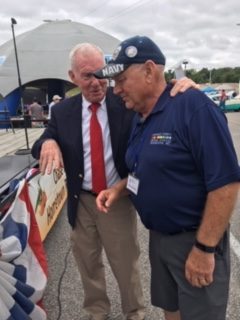
Following his return from Vietnam, Tilford received a bachelor’s of science degree at Indiana University and majored in general science with a minor in chemistry. He worked at the Internal Revenue Service as a revenue officer and then as an administrative intern, a veteran’s benefits counselor then returned to the IRS as a human resources position. He also worked for the Navy as labor relations and employee relations specialist and management analyst. He also served on two national-level federal civilian task forces for the IRS and the Navy.
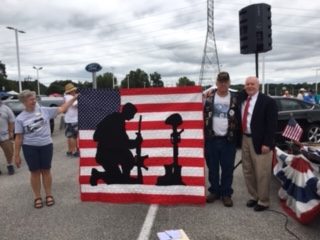
Tilford also received a Master of Science Strategic Intelligence from the National Intelligence University (formerly known as the Joint Military Intelligence College in Washington DC) in 2003.
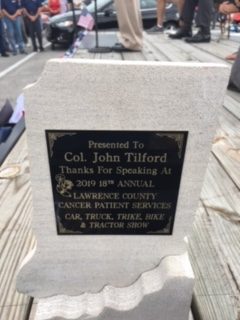
Tilford is also a Quiet MENSA. “Greene County Indiana school system tests pegged me at 160 I.Q. The Marine Corps, after several days without much sleep, I’d like to point out, at 155,” he stated.
Col. Tilford ran for United States House, Indiana 9th District but lost in the Democratic Party primary. He accepted no donations and pledged to serve only one term.
While giving his speech, the Lawrence County Vietnam Veterans Association members stood to his right and La-Mo-Shrine Members were to his left. Members of the public stood throughout the grounds listening intently as he delivered the following speech on Vietnam.
Vietnam:
Today, we are not concerned with the intentions or results of the Vietnam War. Those debates – good or bad, communist dominoes or reelection politics- have no real answers even today. Even if they did, those answers would not add or detract from the efforts of those who served in Vietnam.
Their Vietnam was not experienced in conference rooms or the White House or around a table in Paris.
Theirs was, if they were lucky, in Seabee-built plywood barracks or, if not so lucky, wrapped in a poncho in the rain, or if unlucky, in the mud or an evacuation hospital.
If really unlucky – well, let’s not talk about the bags. We are here today concerned with individual Vietnam Veterans, the living and the dead, and their family members and survivors. What, on their personal level, did Vietnam mean?
‘Vietnam’ means something specific to each and every one of us here today. Nothing I can say will change your specific definition of ‘ Vietnam’.
To some here, ‘ Vietnam’ recalls of cracked bullets – miniature sonic booms, really – going past their heads. If you hear it, missed it. You don’t hear the one that gets you.
Others remember being unbelievably tired. Hot, humid, sweating, carrying heavy loads for long distances, very little sleep, tired.
Others cannot forget being absolutely terrified. Can’t think, can’t move terrified. But you forced yourself to think and move.
To some it means pain. Sudden searing pain. Wondering if you will live pain – Treatment pain. Therapy pain. Chronic disability pain.
Many, too many, remember friends killed.
To some, it means feeling guilty for the rest of your life. “ Why am I here and they are not?”
To some, it recalls “Three days and a wake-up short”. But then a second tour. Maybe a third, thinking they couldn’t be lucky three times.
To some, it still means “ Give me another drink” to forget, but they can’t really forget. Those memories are still there when you sober up. But the numbness does help for a while.
None of those who were there are ever going to be the same. Some show it, some hide it inside, but none are ever the same.
None of those in the States who loved, or knew well, someone who was in Vietnam is ever the same either. No spouse or parent or stateside friend. The evening news and Walter Cronkite and letters, precious letters – all those changed the ones who waited. Seeing them different upon their return. Or finding out they would not return. Killed in Action. Did you know the Killed In Action telegrams were delivered to the next of kin by taxi drivers? Not a Casualty Notification Officer, a taxi driver. Or Missing in Action. Never knowing. None waited for those in service in Vietnam were not changed.
So what difference did the war make? Some say not much, except for those who were killed, wounded or otherwise changed. Others say it preserved freedom. Maybe they are right in some ways. Witness the current ‘Made in Vietnam’ trade.; their embassy in Washington D.C.; their cities with multi-lane highways and tall buildings and tourists. American tourists. Vietnam War Veteran American Tourists.
There is no shortage of madmen today. Al-Qaeda, ISIS, the names change, but the madness seems ever-present. What has changed is how we treated, then and now, those returning to war. This is perhaps the most distinguishing aspect of the Vietnam War for those who served.
Let’s first consider the welcome for veterans who returned before Vietnam:
Those returning from World War II were greeted with parades, celebrations, hugs, and kisses. They had saved the civilized world from pure evil. This was “ Have to fight to survive “ and they won. The entire United States won. Everybody had pitched in. Victory Gardens, rationing everybody. It was finally over. ( We thought four years was a long war then.) Let’s show our thanks and celebrate! Military service organizations flourished and pressured Congress. The G.I. Bill created the middle class. It was the most cost-effective social program in United Stated history The Marshall Plan saved Western Europe and created customers for our trade.
The Korean War, ‘The Forgotten War’ Where is Korea? Why do we care about it? And- the bottom line in more ways than one- “ Those Asian People are not like us.” There was no total war effort, no babies postponed, no industries converted to arms manufacturing, few Rosies the Riveter, no rationing, no war bond drives, no delays of next-years model cars, and hardly any weekly update newsreels before the main movie. There was no personal feeling of a threat to be defeated and therefore no great relief when the armistice, our first non-victory, was signed, Korean War Johnny came home to “ Where have you been? It’s too bad I have no job for you. Fred over there, he didn’t go away. If business picks up, maybe you can assist Fred. But, if business drops, you’ll be laid off first.” Just six years and a different kind of war, the first United States non-winnable war, resulted in a non-reception home. No parades. Just, “ Where have been?”
Let’s consider the welcome for veterans returning from wars following the Vietnam War:
Those returning from the Gulf War had parades, yellow ribbons, and public ceremonies in which veterans of the “One Hundred Hour War” were treated as conquering heroes. The United States military was decisive, for sure, just look at that road to Baghdad with those burning hulks, the BEST! Let’s give those American men and women a welcome home they won’t forget!
Here we are today. Veterans returning from Afghanistan and from Irag have been, and continue to be, met by an “ Honor Our Veterans! Mindset. There are designated volunteer greeters in airports. Military service Organizations are recruiting new members as World War II, Korea, and Vietnam vets’ ranks thin. There were, and still are today, television commercials for all sorts of products sold by heartwarming videos of veterans returning home. Veterans coming home and surprising their spouse, their children, even their dog. Facebook videos. Ads in magazines. Feel patriotic when buying this product being advertised. Stores and restaurants give veterans discounts. United States Flags are sold in Wal-Mart. We have great Memorial Day Events and military floats in Fourth of July parades.
So how were the returning Vietnam War Veterans treated in comparison to those welcomes we just described, including those happening now nearly every day? Similar to the Korean War, people at home did not feel personally threatened by the Viet Cong or North American Vietnamese Army. At first, most were not even indirectly involved and lived normal lives, but that changed as numbers of the dead and wounded Americans started to mount. Johnny was sent home alright, but in a body bag or to linger in a Veterans Administration Hospital, wearing a soiled diaper, sitting sedated in a wheelchair. The draft assured that by the end of the 1960s almost every town in the United States had lost someone to the war, or had someone maimed physically or psychologically.
Unlike the continuing emotional detachment from the Korean War, people at home did start to have strong feelings about the Vietnam War. Feelings strong enough to hate the war and protest and in, reaction, others had feelings strong enough to hate the protestors. The population was divided – a father against son, mother against daughter, neighbor kind of way. Somewhere along the way, the protestor’s disgust with the war expanded to include those fighting it. The protestors hated the military and the military was soldiers, sailors, airmen, and Marines. There was no dramatic, final victory with most of those who fought coming home about the same time. There were “ tours of duty” in a seemingly never-ending war, tours usually twelve months long. These Johnnies came home alone, usually by contract civilian aircraft, easily identifiable in uniform, defenseless- perfect targets for abuse and venting of frustration by those who opposed the war.
Johnny was often called a baby killer. The My Lai Massacre – a result of poor command by third-string officers over frustrated soldiers who knew there was no victory possible and who had just lost several comrades – confirmed for the protestors that soldiers were killers of women and children.
So Johnny was spat upon, refused service, cursed, hit with ripe fruit, and physically struck. Men changed out of their uniform before leaving the airport. Hell, some before leaving the airplane. Men chose to go absent without leave and disappeared. Vietnam veterans did not return to wide comfort and understanding, far from it. Only close family members and friends tried to help.
There was no war victory, no real closure, to reduce the negative feelings. The “ light at the end of the tunnel” was a mirage, another lie. Promises of secret plans to end the war were hollow. Most of us remember where we were when we watched the last helicopter leaving the roof of the United States embassy in Saigon and those Vietnamese who helped the Americans desperately struggling to get on board. “ This is it? All the fighting, all the pain, all the death – for this?”
Many Vietnam veterans felt themselves to be outcasts and suffered alone. PSTD was not a fashionable diagnosis in those years. Treatment if any, was primitive. Where was the victory? Who cared for them? What had they done wrong? Had they not fought so well? When hit had they not bleed? Had they not also sacrificed the best years of their lives?
Then twenty years later a funny thing happened. There was a “ yellow ribbon round the old oak tree.” Hundreds of thousands of yellow ribbons around everything that did not move and some things that did. The returning Gulf War Veterans were welcomed, nay, embraced the media, the home towns, the major cities, and everyone felt good. If you looked hard, you could see forgotten Vietnam War Veteran parents tying yellow ribbons for their sons and daughters coming back from the Gulf, and later for grandchildren returning from Afghanistan and Iraq. They did not want what had happened to them to happen to any other United States military men and women returning from war.
Too late for many Vietnam veterans to see, the rest of America has slowly come to realize that those who fought in Vietnam – those who fight in any war – are not to blame for the politics, the false promises, even the killing. The “crazed” Vietnam War Vet” jokes became less funny. Veterans Courts were started to accommodate those who found it difficult to function within the norms of society. A Post 9/11 service G.I. Bill was passed. The Department of Veteran Affairs obtained better funding for medical care and a better appreciation for Post-Traumatic Stress Disorder and the effects of the stealthy killer, Agent Orange.
More VA cemeteries have been opened. When I talk through them and read the “ Vietnam inscribed markers, I am stunned by how many lying below were born after me.
As I look out at you today, I see good men and women. You would not have been here if you were not. I offer you this thesis for your consideration: was not the extent of gratitude shown by Americans to veterans returning from the first Gulf War and later wars not, in some way, a result of what had been denied the Vietnam veterans? Is there such a thing as collective regret? Resulting in a collective determination to do better? I think there is. The alternative, that there really was something uniquely bad about the Vietnam War veterans, is as incredible as it is undeserved. They served at least as well and at least as honorably as veterans of any other war.
If any benefits resulted from the poor treatment of Vietnam veterans, contributing to the restored status of veterans in America must rank the highest.
The mistreatment of Vietnam veterans was yesterday, and yesterday’s gone! Although the scars remain, yesterday’s gone. Yesterday’s gone.
I will cheerfully accept my ten percent discount at Lowe’s! And a free meal at Texas Roadhouse on Veterans Day! And remember the good days – there were some good days too – in Vietnam. And remember the comrades I made there and the ones I lost there. And the ones I’ve lost since. And blink back a tear. And move on.
Let’s close with one more thought: Vietnam veterans and veterans from every other war, campaign, conflict, and deployment: welcome home, welcome home.
At the conclusion of the speech, there was applause and many greeted the Colonel on a well-delivered speech. But, just imagine some of the reflection, with minds drifting back to those days of the many that lived that period of time personally.



